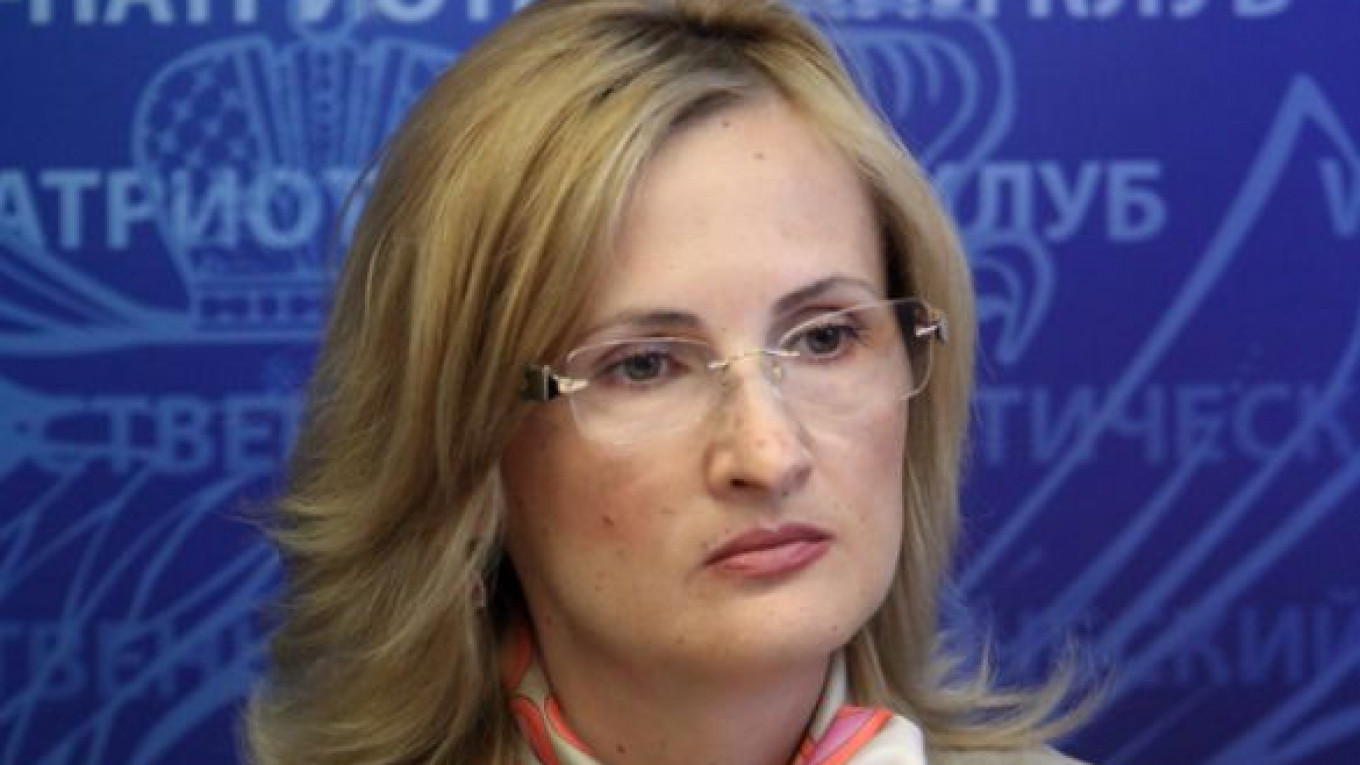Supporters and opponents of legislation to tighten the screws on foreign-funded nongovernmental organizations hotly debated the bill Thursday, the eve of a first reading in the State Duma.
“Citizens have a right to know about organizations that use foreign founding,” United Russia Deputy Irina Yarovaya, who co-authored the bill, told a roundtable.
She said a stipulation requiring foreign-funded NGOs that engage in “political activity” to register as “foreign agents” with the Justice Ministry would do nothing more than bring existing NGO law into line with the European norm.
But NGO leaders said the bill targeted specific organizations unpopular with the government.
“It looks like the law is written for Golos,” said Lilia Shabanova, executive director of Golos, the only independent elections watchdog in Russia. The group receives grants from the U.S. Agency for International Development and discloses this information on its website.
“When a public organization is placed on a list of political organizations, that prompts a lot of concern,” said Shabanova, who stressed that Golos is not involved in political activity.
She was echoed by Boris Nemtsov, a senior opposition leader, who said the legislation put organizations like Golos, Amnesty International and Transparency International “in danger.”
“There is a big risk that the NGOs that will be targeted will be those that are the last line of defense for our citizens,” said A Just Russia leader Sergei Mironov, adding that his party would not vote for the bill in the Duma on Friday.
Mikhail Fedotov, head of the Kremlin’s human rights council and a lawyer by training, cautioned that the legislation lacks a clear definition of “foreign agents.”
“A good law is a precise law,” he said. “When you draft a law, you should understand whom you want to include in it.”
Fedotov, who earlier this week said the Russian Orthodox Church could be affected by the bill because it accepts contributions from believers in other countries, expanded the warning Thursday to include Russian government ministries, which he said accept foreign funding for various projects.
“I can’t imagine a Russian ministry being classified as a foreign agent,” he said.
Fedotov said any organization designated a “foreign agent” would face a public relations nightmare because to the public ear, the phrase amounts to calling it a foreign spy.
United Russia lawmakers have defended the phrase, saying they took it from U.S. law. The 1938 law, however, targets political lobbying groups that seek to influence the U.S. government, not NGOs.
Incidentally, the U.S. law was used against Anna Chapman and other Russians arrested in the United States in 2010 on charges of conspiring to act as an agent of a foreign government without notifying the U.S. attorney general.
U.S. lawmakers are keeping an eye on Russia’s NGO bill, said Andrei Piontkovsky, a leader of the opposition Solidarity movement. Speaking to Izvestia, he said that his group had met with U.S. Congress members on Wednesday to discuss possible sanctions against the Russian officials who had initiated the NGO bill.
“It’s no secret that the list of people declared persona non grata in the European Union and the United States will grow,” he said, in a nod to a 2011 U.S. blacklist of dozens of Russian officials implicated in the prison death of lawyer Sergei Magnitsky.
Nemtsov said Thursday that opposition protests would continue with or without the new legislation. “This is an odious, repressive bill that seeks to halt the wave of public protests,” he said. “Authorities are preparing for more protests, which will occur regardless of whether the law is passed.”
Human rights veteran Lyudmila Alexeyeva said she wouldn’t register her Moscow Helsinki Group as a foreign agent.
“I would be very happy to receive Russian funding, but the Russian state doesn’t give me any money because I defend Russian citizens from Russian officials,” she said.
Duma Speaker Sergei Naryshkin presided over the roundtable. He is the most senior official to publicly address the bill.
A Message from The Moscow Times:
Dear readers,
We are facing unprecedented challenges. Russia's Prosecutor General's Office has designated The Moscow Times as an "undesirable" organization, criminalizing our work and putting our staff at risk of prosecution. This follows our earlier unjust labeling as a "foreign agent."
These actions are direct attempts to silence independent journalism in Russia. The authorities claim our work "discredits the decisions of the Russian leadership." We see things differently: we strive to provide accurate, unbiased reporting on Russia.
We, the journalists of The Moscow Times, refuse to be silenced. But to continue our work, we need your help.
Your support, no matter how small, makes a world of difference. If you can, please support us monthly starting from just $2. It's quick to set up, and every contribution makes a significant impact.
By supporting The Moscow Times, you're defending open, independent journalism in the face of repression. Thank you for standing with us.
Remind me later.






